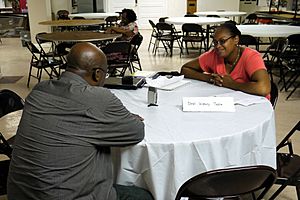Oral history facts for kids
Oral history is a special way of learning about the past. Instead of reading old books or documents, people gather oral history by listening to others tell their stories. It's like having a conversation with someone who lived through an important event, and they share what they saw, heard, and felt. This helps us understand history from a personal point of view.
Though today oral history is not as popular as written history, it is still used in many places as a way of transferring knowledge about the past.
Contents
What is Oral History?
Oral history is history that is told out loud, rather than written down. It is usually passed from one generation to the next. People share their memories and experiences to explain events that have happened. Think of it as a living record of the past, kept alive through talking.
This type of history is different from what you might read in a textbook. Textbooks often focus on facts, dates, and big events. Oral history, however, focuses on the personal side. It tells us how people felt, what they believed, and what their daily lives were like during important times.
Why is Oral History Important?
Oral history is very important because it helps us learn about things that might not be written down anywhere else. Many people, especially those from groups whose stories were not often recorded, have valuable memories. These memories can give us a fuller picture of the past.
- It captures personal feelings and experiences.
- It gives a voice to people who might not have written their stories.
- It helps us understand different points of view about historical events.
- It can fill gaps in written records, especially for everyday life.
- It connects us directly to the past through the words of those who lived it.
For example, an oral history might tell us what it was like to live during a major war from a child's perspective. Or it could describe how a community worked together to solve a problem many years ago. These stories add richness and depth to our understanding of history.
How is Oral History Collected?
Collecting oral history involves careful steps to make sure the stories are preserved. It's more than just a casual chat.
- Interviews: The main way to collect oral history is through interviews. A trained interviewer talks to someone who has lived through an event. They ask open-ended questions to encourage the person to share their memories freely.
- Recording: These interviews are usually recorded, often using audio or video. This makes sure every word is captured accurately. The recordings are then kept safe for future generations.
- Transcribing: After recording, the interviews are often written down, or "transcribed." This makes it easier for researchers and students to read and study the stories.
- Preserving: The recordings and transcripts are then stored in places like libraries, archives, or museums. This ensures they are protected and available for people to learn from for many years to come.
Interviewers try to create a comfortable space for the person sharing their story. They listen carefully and ask follow-up questions to get more details. They also make sure to respect the person's privacy and wishes.
Who Uses Oral History?
Many different people and groups use oral history for various reasons.
- Historians: These are people who study the past. They use oral histories to get new information and different viewpoints for their research. It helps them write more complete and accurate historical accounts.
- Students: Young people like you can learn a lot from oral histories. They offer a direct connection to the past and make history feel more real and personal.
- Communities: Local communities often use oral history to preserve their own unique stories and traditions. This helps them remember where they came from and celebrate their heritage.
- Filmmakers and Artists: Oral histories can inspire movies, documentaries, plays, and other forms of art. They provide powerful personal narratives that can be shared with a wider audience.
- Families: Many families collect oral histories from their older relatives. This helps them understand their family's past and pass down important stories to younger members.
Oral history helps us understand that history isn't just about famous leaders or big battles. It's also about the everyday lives and experiences of ordinary people.
See also
 In Spanish: Historia oral para niños
In Spanish: Historia oral para niños


